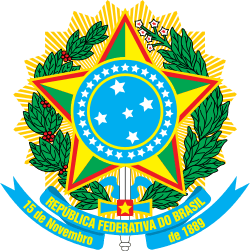Attorney General of Brazil
| Attorney General of the Union
Advogado-Geral da União | |
|---|---|
 | |
|
Incumbent Grace Maria Mendonça since 9 September 2016 | |
| Reports to | the President |
| Formation | 12 February 1993 |
| Website |
www |
 |
| This article is part of a series on the politics and government of Brazil |
|
| Foreign relations |
The Attorney General of the Union,[1] or Solicitor General, (Portuguese: Advogado-Geral da União, AGU) is a cabinet-level position in the Brazilian government charged with advising the Executive Branch and representing the federal government of Brazil in legal proceedings.[2] The Attorney General is defined under Article 131 of the Brazilian Constitution as one of the essential functions of Brazilian judicial administration, along with the roles performed by the judicial branch, the Prosecutor's office, the public defenders and private lawyers.[1][3][4] The current Attorney General is Grace Maria Mendonça.[5]
The Attorney General of the Union is appointed by the President of Brazil and confirmed by the Senate. Under the constitution, the Attorney General must be at least 35 years old.[6] All Attorneys General within the Office must be bar members in Brazil. The Attorney General of the Union is a member of the Brazilian cabinet, holds the rank of Minister, and is also the head of the Advocacia-Geral da União (AGU), which is an essential function and branch of the federal government formed by its own Federal Prosecutors.
The Federal Prosecutors who compose the AGU are divided in four careers: the National Treasury Prosecutors (Procuradores da Fazenda Nacional), who represent the federal government in financial issues; the Union Attorneys (Advogados da União), who represent the government through general cases, the Federal Prosecutors (Procuradores Federais), who represent the federal agencies; and Brazilian Central Bank Prosecutors (Procuradores do Banco Central). Their functions are not limited to the Judiciary, and they are also responsible for inside legal control of the government and international legal representation of the Republic.[1][6]
List of Attorneys General
| Attorney General | Period of service | Appointed by |
|---|---|---|
| José de Castro Ferreira | February 1993–May 1993 | President Itamar Franco |
| Alexandre de Paula Dupeyrat Martins | May 1993–June 1993 | |
| Tarcísio Carlos de Almeida Cunha | June 1993–July 1993 | |
| Geraldo Magela da Cruz Quintão | July 1993–December 1994 | |
| January 1995–January 2000 | President Fernando Henrique Cardoso | |
| Walter do Carmo Barletta | January 2000 | |
| Gilmar Ferreira Mendes | January 2000–June 2002 | |
| José Bonifácio Borges de Andrada | June 2002–December 2002 | |
| Álvaro Augusto Ribeiro Costa | January 2003–March 2007 | President Luiz Inácio Lula da Silva |
| José Antônio Dias Toffoli | March 2007–October 2009 | |
| Luis Inácio Lucena Adams | October 2009–March 2016 | |
| José Eduardo Cardozo | March 2016–May 2016 | President Dilma Rousseff[3] |
| Fábio Medina Osório | May 2016–September 2016 | Acting President Michel Temer[7] |
| Grace Maria Mendonça | September 2016-present | President Michel Temer[5] |
Prosecutor General of Brazil
The prosecutorial duties of the office of the Attorney General were split off to a new Prosecutor General, named Prosecutor General of the Republic, under Article 4 of Law No. 73 of February 10, 1993. The office of Prosecutor General of the Republic (PGR) is an autonomous agency in charge of criminal prosecution and the defense of society in general, versus the office of the Attorney General, which represents the federal government in legal proceedings.
The Prosecutor General of the Republic (PGR) is the head of the Federal Public Ministry (Ministério Público Federal), which is also an essential function but holds the responsibility for criminal prosecution. Differently from the AGU, the members of the Federal Public Ministry are called "Republic Prosecutors", and are in charge of criminal prosecution at the first level of the Federal Justice. Despite the title, the Republic Prosecutors do not legally represent the Republic in international issues, which is a responsibility of the members of the AGU.[8]
See also
- Prosecutor General of Brazil
- Brazilian Ministry of Justice
- Brazilian Public Prosecutor's Office
- Brazilian Public Defender's Office
- Other attorneys general
References
- 1 2 3 "Advogado-Geral da União" [Attorney General of Brazil] (in Portuguese). Brasília-DF, Brasil: Portal Brasil, Governo Federal do Brasil. 2014. Retrieved 2014-11-26.
- ↑ "Presidência da República, Casa Civil, Subchefia para Assuntos Jurídicos, LEI COMPLEMENTAR Nº 73, DE 10 DE FEVEREIRO DE 1993" (in Portuguese). Brasília-DF, Brasil: Portal Brasil, Governo Federal do Brasil. 1993. Retrieved 2014-11-18.
- 1 2 Valente, Christiano Mendes Wolney (2013). "Histórico e Evolução da Advocacia-Geral da União" [History and Evolution of the Attorney General of Brazil] (PDF) (in Portuguese). Brasília-DF, Brasil: Portal Brasil, Governo Federal do Brasil. Retrieved 2014-11-18.
- ↑ "Perguntas Frequentes" [Frequently Asked Questions] (in Portuguese). Brasília-DF, Brasil: Portal Brasil, Governo Federal do Brasil. 2014. Retrieved 2014-11-26.
- 1 2 http://oglobo.globo.com/brasil/michel-temer-confirma-grace-mendonca-para-agu-20077950
- 1 2 Alves Jr., Luís Carlos Martins (2012). "Advogado-Geral da União: notável saber jurídico e reputação ilibada" [Advocate General of the Union: remarkable legal knowledge and unblemished reputation] (in Portuguese). São Paulo, Brazil: Jus Navigandi. Retrieved 2014-11-18.
- ↑ "AGU Brasil desta semana destaca posse do novo advogado-geral da União, Fábio Medina" (in Portuguese). Brasília, Brazil: Adivocacia-Geral da Uniao. 2016. Retrieved 2016-05-13.
- ↑ "Sobre a Instituição: O Ministério Público Federal" [About the Institution: Prosecutor General of Brazil] (in Portuguese). Brasília, Brasil: Ministério Público Federal. 2014. Archived from the original on 2014-11-12. Retrieved 2014-11-18.
.svg.png)